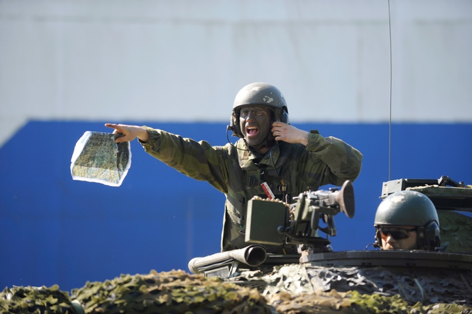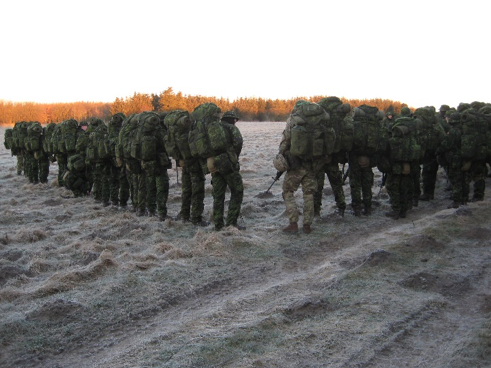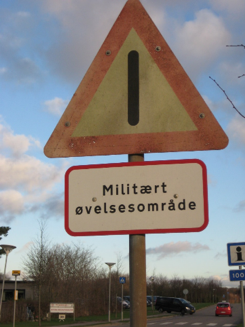Humor in the military professions: a case study on exclusion in the Nordics
In principle, all levels of the male-dominated professions in the Nordic countries are accessible to men and women alike. But, informal processes of exclusion may interfere with gender integration; an extensive use of humor can, for example, interfere with women’s attempts to become part of the military profession. While military organizations are typically characterized as quite formal, humor and laughter also play an essential role in the everyday interaction between soldiers. This supports the forming of social bonds, upholds morale, and ensures that most soldiers can cope with an (at times) exhausting and overwhelming job. It might also have negative consequences, not least for women’s inclusion. So, while the Nordic countries are often seen as societies at the pinnacle of gender equality, research shows that here, too, inclusion is far from ensured in the workplace.
![Försvar [Defense] in Sweden. Försvar [Defense] in Sweden.](/fileadmin/ingen_mappe_valgt/Fo__rsvar_Norden.org_Johannes.png)
Inclusion and exclusion of women in security organizations
There is currently an increased focus on gender issues within militaries and police forces in the Nordic countries. While both Sweden and Norway have recently introduced a gender-neutral military service – thus further welcoming women into the armed forces – stories about sexual harassment of female soldiers have in 2019 filled the news in both Denmark and Norway. A recent study from the Danish Defence has for instance documented that 17% of women in the army and 24% of women at the defense college found their workplace to have a sexist tone or culture. Within the police forces, women make up a far greater percentage of personnel than in the armed forces, yet they are almost absent in specialist units and leadership positions. Such seemingly contrasting tendencies can be seen as the outcome of the co-existence of formal inclusion but cultural exclusion of women.
While the Nordic armed and police forces make efforts to recruit more women, mechanisms of exclusion concurrently appear to challenge the retention and full inclusion of women in these male-dominated professions. Consequently, women appear to become what we might call cultural “outsiders within” due to an unfortunate combination of formal acceptance and informal marginalization. The great challenge entailed in this process seems to be how women are facing subtle processes of exclusion that are not necessarily framed as a matter of gender but rather individual shortcomings; the individual woman being deemed, for example, as being unable to take on leadership, unable to collaborate, too weak to be part of a specialized unit, and not being able to cope in a ‘tough’ environment, etc.
It can indeed be argued that the military is a very unique profession. Yet, the mechanisms discreetly “pushing” women out of the military profession, or at least away from, prestigious positions appear very similar across the security professions. Case studies from the Danish armed forces can illustrate how something as apparently harmless as humor can work in both including and excluding ways.
| PICTURE: The military profession might be perceived as inherently distinctive from any other – but perhaps the mechanisms negotiating inclusion and exclusion are not that different. Photo: Beate Sløk Andersen. |
Humor and laughter in a military context: organizational and social glue
Existing research has described the use of humor in a military setting as a disciplining mechanism, a way of excluding that which disrupts efficiency and cohesion, a way to keep one’s honor intact within the hierarchal system, a way to build social bonds, and a way to express critique or complaints without disrupting cohesion. Jonas Engman, who has carried out ethnographic studies of the Swedish navy, has for instance shown how the use of humor in that context worked as a counterbalance to the strictness required in the job (2014). It helped to create informal bonds and complicity amongst the sailors, while also giving them an opportunity to challenge the social order of the navy.
Laughter plays a key role in the Danish military too. Having done ethnographic work in this organization over the last four years – combining interviews, observations, meetings, and joining an army platoon through their basic training – I have noted how laughter plays a key role. Along with the strictness of hierarchy and discipline, a perhaps surprisingly widespread use of humor is a recurrent element in the social interaction between soldiers. Everything from telling jokes to mocking and teasing has appeared to be a recurrent feature in the military profession; not just in Denmark, but across the Nordic countries and beyond (see e.g. Sundevall 2014, and Godfrey 2016). In a Danish context, I would further argue that soldiers even take pride in this humorous tone.
Examples from the field: “This guy could f*** you, right?”
Having been part of the everyday life of soldiers going through basic training, I have encountered many examples of jokes, ridicule, pranks, and laughter. Even the sergeants who were supposed to discipline the soldiers were keen on lightening the atmosphere by telling jokes or encouraging others to do so. For that reason, we even had a week with a daily competition of who could think of the best joke. This did indeed help lighten the mood. But it also worked as a mechanism of exclusion, as the following examples will illustrate.
During a presentation about the working environment and sexual harassment, an advisor at the military base remarked that:
“it is of course not prohibited to tell a naughty joke, but try to be considerate of each other [...] The tone can be rough every once in a while. We have a certain jargon here.”
Becoming a soldier, it can be said, is about becoming part of a collective in which humor is an inherent element. But, becoming a soldier also entails meeting expectations and performing as ‘good’ soldiers are supposed to perform (Sløk-Andersen 2018). Those who did not meet particular expectations were met with laughter and ridicule – when missing the target while shooting, when being out of action with an injury, when not hooking up with someone in a bar, etc.

PICTURE: Members of the Swedish armed forces (Försvar) on a military exercise. Photo: Johannes Jansson, Norden.org. CC BY-NC-SA 4.0.
Being a woman in a male-dominated profession is another way of not meeting expectations, we might say. In Denmark this is emphasized by male-only conscription indicating that women are not expected to be present in the first place. As a consequence, equipment, performance requirements, traditions, and modes of interaction are molded from a male standard. This was particularly vivid at a military base where I carried out a few days of observations in 2017. Here, a group of female conscripts described how they received daily comments like “This guy could f*** you, right?” They had gotten used to such comments from male peers, taking them merely as attempts to be funny from the men’s side. However, certain incidents over the preceding few weeks had been “the last straw” and had made one of them reach out to a sergeant. Because, while their male peers seemed to consider their actions as merely playful and fun, being surrounded by male soldiers only wearing underwear, being pulled into someone’s dorm room, or being surprised in the shower, had worn them down. The women were no longer able to just shake it off.
Taking the matter to their superiors, the women were well aware that they were ruining ‘the good mood’ . They were turning something intended to be a joke into quite a serious matter as the commanders addressed this as a case of sexual harassment. Despite this, the women remained very unsure if their experiences could even be labelled 'sexual harassment'. Can you be offended and make formal charges against someone who supposedly just wanted to contribute to the humorous atmosphere?
The consequences of not being in the mood for a joke
Based on such observations, humor and laughter appear to concurrently work as a positive and including mechanism while also camouflaging exclusion. While everyone can be the butt of the joke every once in a while, laughter seems to 'stick' to some soldiers more than others (to use Ahmed's expression (2017)). Seemingly innocent comments or actions that are “just a joke” take part in establishing limitations and norms for how to be a good soldier, as I argue in an article from 2019. In this way, humor takes part in the negotiation around the recognition of ‘insiders’ in the military profession in subtle ways. Further, as jokes are often based on an assumed active male heterosexuality, women are left in an awkward position where they appear to often just learn to live with it. Or not. And then they are more likely to leave the military altogether – just like others who do not feel welcome due to this type of informal policing which is enforced through humor.

PICTURE: Conscripted soldiers on a cold day during a drill. Photo: Beate Sløk Andersen
Further reading:
- Beate Sløk-Andersen, ‘The Becoming of Good Soldiers. An Ethnographic Exploration of Gender and Other Obstacles in the Military Borderland. PhD dissertation, Faculty of Humanities at University of Copenhagen (2018).
- Beate Sløk-Andersen, ‘The Butt of the Joke? Laughter and Potency in the Becoming of Good Soldiers’, Cultural Analysis, 17, 1 (2019) pp. 25-56.
- Fia Sundevall, ’Porr i vapenskåpet och bögkompani på Gotland.’ [Porn in the gun cabinet and the gay company on Gotland] in Lumpen. Från mönstring till muck. Armémuseum årsbok [Shabby. From muster to demob. Army Museum’s year book] (Stockholm: Atlantis, 2014), pp. 150-170.
- Sara Ahmed, ‘Living a Feminist Life’ (Durham: Duke University Press, 2017).
- Jonas Engman, ’ Den skrattande löjtnanten: Parad, karneval och humor’ [The laughing lieutenant: Parade, carneval and humour] in Skratt som fastnar. Kulturelle perspektiv på skratt och humor [Laughter that gets stuck. Cultural perspective on laughter and humour] (Lund: Lund University, 2014), pp. 19-37.
- Richard Godfrey, ‘Soldiering on: Exploring the role of humour as a disciplinary technology in the military.’ Organization, 23, 2 (2016), pp. 164-183.
- Jens Rennstam & Katie Sullivan, ‘The Limits of Inclusion: Stories from the Margins of the Swedish Police’ in T. Köllen (Ed.) Sexual Orientation and Transgender Issues in Organizations (New York: Springer, 2016), pp. 339-352.
- Sara Louise Muhr & Beate Sløk-Andersen, ‘Exclusion and inclusion in the Danish military: A historical analysis of the construction and consequences of a gendered organizational narrative’, Journal of Organizational Change Management, 30, 3 (2017), pp. 367-379.
Links:
- A longer version of this analysis can be found in Cultural Analysis and Tidsskrift for Kjønnsforskning [Journal for Gender Research].
- The Danish Ministry of Defence publication: Forsvarsministeriet, ’Undersøgelser af krænkende adfærd 2019. Resultatrapport for Forsvarsministeriet i alt’, [Investigations of abusive behavior 2019. Performance report for the Ministry of Defense in total] 2019.
- This analysis has been carried out within the framework of the research project Gender Equality, Diversity and Societal Security funded by NordForsk (2018-2021). As part of this research project, Beate Sløk-Andersen is exploring processes of inclusion and barriers to diversity in military organizations.
